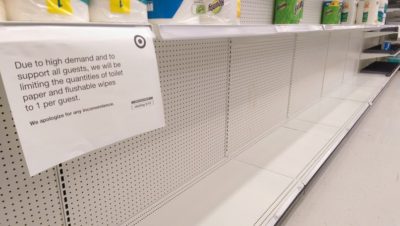
Stores limit purchases after toilet paper supplies sell out due to hoarding at start of corona virus scare. Photo by Christina Leimer
Whether for individuals, families, communities or whole societies, change is most likely when there’s a crisis. That’s now. With global travel nearly none, large social events cancelled, schools and non-essential businesses shuttered so people can #ShelterInPlace, the coronavirus lockdown is giving us ample time to think about how we do what we do and why we do it that way. We have time to notice the effects and question taken-for-granted assumptions. Americans don’t typically reflect at the societal level. So, what if we did?
The huge disrupters are 1) a global pandemic, and to try to stop its spread, 2) social distancing. We can’t know how long the #stayathomechallenge will last. Many scientists are working to develop a vaccine—but even when they do, there will be other global disease outbreaks. What can we learn and change that will help us prevent disease spread in the future and handle it when prevention fails?
A few things I question:
Global Travel: Yes, it’s interesting and informative and helps us realize we’re all connected. But how much of it do we really need? For business, how much of it is a perk or status-driven? With easy videoconferencing access, why not use this technology most of the time instead of in-person travel?
Global travel isn’t likely to stop forever, so what could change given the reality of pandemics? Over time, airlines have been packing us in closer and closer together, smaller seats, less leg room, longer wait times in airport terminals and on tarmacs. Are there ways to spread us out? Ventilate the cabin? What’s up with air traffic control that we’re sitting on the runway for an hour or more? What about airplane design? I’ve often wondered why everyone must enter and exit through a single door instead of using the side and rear doors of the plane too.
Staying Home: Despite American individualist culture, it’s also highly social. Most people spend a lot of time with others. As a society, we’re busy, busy, busy. Being so busy might be why home delivery services have been increasing already. Even high-end restaurant food can now be delivered. With restaurants in several States ordered to close except for take-out, might this be a change that sticks around? Will there be fewer sit-down restaurants? Or fewer tables farther apart, accommodating less customers? Many restaurants already operate on a thin profit margin and it’s a high failure rate business. Maybe it’s an industry ripe for change.
Sick Leave and Healthcare Coverage: Making sure all Americans can get healthcare is an ongoing political battle. Many employers don’t provide paid sick leave either. That too has been a political fight with little traction. In the scramble to halt a pandemic, lack of sick leave and no health insurance is a deadly combination. Congress just passed the Families First Act. That bill offers some paid leave to employees of companies with fewer than 500 employees with potential exemption for smaller companies. Also, it requires anyone seeking testing or treatment for coronavirus to be treated at no cost to them. But, the bill is only funded through September of this year—the end of the fiscal year and is slated to end with the 2020 calendar year. Will paid sick leave become a standard practice? Will all Americans get access to low-cost healthcare in general after this crisis passes?
Insufficient Hospitals and Medical Supplies: With about 6,000 hospitals and 900,000 beds in the U.S. (American Hospital Association), a pandemic can quickly outstrip capacity. Over the last couple of decades many hospitals have closed due to changes in the healthcare industry and cost. Many rural areas have little or no healthcare providers or facilities. Infrastructure in general, schools, roads, utilities, has been minimally maintained. Will this crisis prompt review and updating of physical infrastructure? More telemedicine?
Schools: Why keep the agrarian-originated summer-off schedule? Yes, I know for teachers it’s become a perk to have 3 months off. Families have accommodated and travel during summer. But, school could be year round with break times staggered. Teachers could take breaks at different times. Instead of crowding vacations into a single season, spread them out. And while we’re questioning, what about the day-to-day scheduling. I know some parents work nights and weekends and all kinds of hours, but most business happens during the day. Why not schedule school hours to coincide with most people’s work day?
Cities: This is a question I’ve been wondering about for a while, why are we piling up in cities? And in a relatively few major cities? Given the technology we have for communication, for delivery, for manufacturing and printing, why aren’t we living in more, smaller cities and towns?
The questions we might ask are unlimited. My point for this post is just to take advantage of this crisis time to get us thinking and imagining how our social institutions and the ways we live might be different, and better for us. What questions are you asking?
